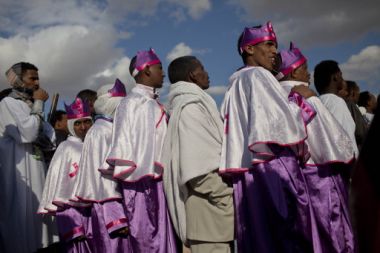Report claims 30,000 Eritreans kidnapped in 5 years

A report presented to the European Parliament shows that around 30,000 Eritreans have been kidnapped since 2007 and taken to the Sinai while ransom payments are demanded.
The report, conducted by an Eritrean human rights activist and professors from a Dutch University, says that a total of around $600 million (£364 million) was extorted from families. During its launch in London on December 4, it was confirmed that Christians were among the thousands kidnapped.
Eritrea is ranked 10th on the 2013 World Watch List, which ranks the 50 countries in which Christians are most under pressure for their faith. According to Eritrea's Evangelical Alliance, approximately 1,200 Christians are now incarcerated in Eritrea.
After 366 refugees died in early October off the coast of Lampedusa in Italy, where they had been attempting to find refuge, Father Mussie Zerai, Chairman of the Habeshia Agency, which works on behalf of these migrants, told World Watch Monitor the majority of those involved in the shipwreck were Christians.
"I look at the list of the survivors and 90 per cent is Christian," he said. "They are coming from Eritrea and Ethiopia. The situation is very bad because politically in Eritrea there is a dictator and they live without any type of freedom or democracy. Many Christians are persecuted because of their faith. It's not easy for them to live in Eritrea at this moment."
The report says that Eritrea's Border Surveillance Unit (BSU) and Sudanese Security officials are among the "actors" collaborating with the gangs that hold people hostage in Sinai.
The Eritrean military was also blamed for abducting young people and forcing them to join the National Youth Service, while the Eritrean government came under fire for its inability to protect its citizens.
However, speaking to BBC's Focus on Africa, Eritrean Ambassador to the UK, Tesfamicael Gerahtu, denied the allegations, citing a conspiracy between Eritrean asylum seekers and the West. He said the Eritrean government was doing its best to deal with the criminals.
One case which highlights the human trafficking journey from Eritrea to Egypt was movingly presented at the report's launch.
Dawit, a British citizen from Eritrea, said that his sister, a single mother, was kidnapped on her way to work on July 12.
He said that when she did not come home after work, her eldest daughter went to her office, but found no sign of her and was told by locals that the business had not opened that day.
The next day, Dawit received a call from his mother in Eritrea telling him that she had received a call from someone in Sudan saying that his sister had been kidnapped and demanding $10,000 for her release.
Dawit told the gathering that he had no money at the time and that his mother didn't want her son in London to call the kidnappers in case they increased the ransom upon realising that a family member lived and worked in the UK.
Dawit said that he was unable to raise the sufficient funds, whereupon his sister was tortured. He said that his mother received phone calls, during which his sister was raped and her mother was forced to sister to her screams. With her mother still on the phone, the kidnappers also electrocuted her and threatened to kill her unless the ransom could be paid.
Eventually, Dawit was able to raise the money by selling his car and borrowing money. The ransom was then paid, but the kidnappers failed to release his sister despite their promises to do so.
Dawit's sister was eventually said to have been released to the Egyptian authorities, but he has since heard no word from her. He says that his sister's ordeal shows that the Eritrea government cannot protect its citizens.
Dawit's efforts to get the UK government's help in securing his sister failed. However, Stop Sinai Torture activists reported that they have since held meetings with the UK's National Crime Agency (NCA) and there is a strong move to gather evidence and to prosecute the perpetrators.
Selam Kidane, a human rights activist, said that the average amount demanded by kidnappers has increased over the years from $5000 in 2009 to $30,000 today. Kidane said that even those who were released were severely traumatised.
The report claims that those released in Egypt and Israel were generally opposed to returning home, but were forced to return and, in Egypt, were ordered to pay a repatriation fee.
Meanwhile, the report claims those released in Libya are often detained, tortured, raped and forced to work for free.











